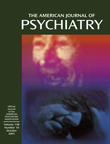Residual Symptoms and Impairment in Major Depression in the Community
Abstract
OBJECTIVE: Studies of patients with major depression in treatment settings have found significant residual symptoms and impairment after resolution of the depressive episode. However, only a small proportion of individuals with major depression seek treatment, and little is known about the residual symptoms and impairment associated with major depression in the community. This study used data from the National Comorbidity Survey, which included a nationally representative household sample of respondents in the United States, to assess the course of residual symptoms and impairment after resolution of major depressive episodes in the community. METHOD: National Comorbidity Survey respondents with lifetime major depression who were currently experiencing a major depressive episode and respondents whose last episode had ended more than 1 to 6 months, more than 6 to 12 months, or more than 12 months ago were compared with those without a history of major depression with regard to depressive symptoms and days of impairment in work functioning or other activities in the past 30 days. RESULTS: Respondents whose last episode of major depression had resolved even more than a year ago were still more symptomatic than those without a history of major depression, whereas the number of days of impairment returned to a level indistinguishable from that of respondents without a history of major depression after >6 tο 12 months of resolution of the last episode. CONCLUSIONS: Major depression in the community, as in treatment settings, is associated with residual symptoms and impairment. In the community, however, residual impairment may resolve more quickly than residual symptoms.



